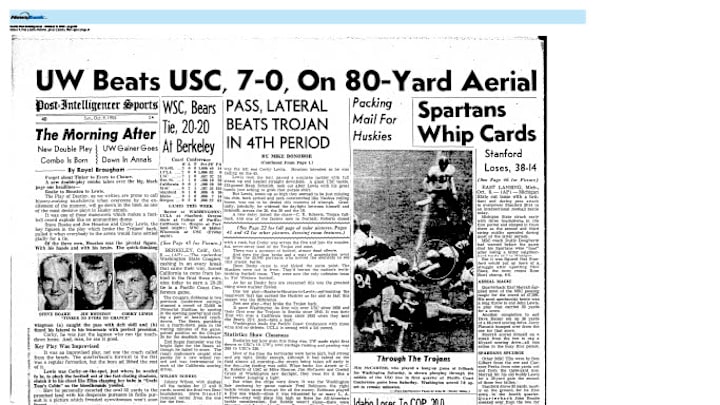Steve Roake, Husky QB Who Beat USC With Trick Pass Play, Dies at 91

Steve Roake released the pass just as a fierce USC rush leveled him. He heard a roar from the Husky Stadium crowd. His first thought was interception. He saw someone other than his intended receiver running with the ball. He looked for penalty flags. He saw a miracle unfold instead.
It was 1955 and Roake was the trigger man on one of the most electrifying plays in University of Washington football history, dumping a 25-yard pass over the middle to end Jim Houston, who pitched it to fellow end Corky Lewis, the three of them combining for an ad-libbed 80-yard touchdown play with 6:20 remaining -- the only score in a stunning 7-0 victory over the 10th-ranked Trojans.
On Wednesday afternoon, Roake, a Chicago native whose UW football career was punctuated by that bit of October afternoon trickery and who later became a Pan American Airlines commercial pilot, died following a long illness. He was 91.
Roake will forever be remembered for being part of the sandlot-style play, though all he did was toss the ball over the middle and take a staggering hit, leaving his two ends to improvise in a most precise fasthion to come up with the game-winning play over mighty USC.
"What do those Southern California sports writers think of us now?" the quarterback said in the postgame, a little defiantly.
Roake was one of the UW's most storied recruits during the 1950s, an all-everything guy from Chicago's northern suburbs, brought to Seattle as a big-play end and defensive back from Barrington High School. As a senior, he scored 17 touchdowns, 10 on receptions, four on end-around runs and three on interceptions. He received every conceivable honor, including his selection to a prep All-America team.
The Huskies found him through Dr. Alfred Strauss, a Chicago-based supporter that made it his business to encourage dozens of players to leave the Midwest and enroll at his alma mater. Roake could have gone anywhere he wanted. He toured Michigan and Illinois. He and his father took a train to West Point and had dinner with Vince Lombardi, a trip the Chicago papers later claimed had been improperly arranged by Army but was never proven.
"It wasn't what I had done," said Roake, who kept the accusatory clips stored among his keepsakes. "It was how many guys make the front page of the Tribune?"
His arrival in Seattle was big news, too. He was all set to become one of the leading receivers for All-America quarterback Don Heinrich when he tore ligaments in his left knee during a scrimmage and was forced to sit out the 1952 season. His career would get more complicated, with his coaches constantly looking for a quick fix and moving him around like a chess piece.
The next season, Roake was converted to quarterback and played behind Arnie Bergh and Dean Rockey, a great source of frustration for him. In 1954, he was back at end, among the nation's leaders in receptions after a few games, when quarterback Sandy Lederman went down with a broken leg. The new guy, Bobby Cox, never threw to him.
As a senior in '55, Roake was returned to quarterback, after Cox transferred to Minnesota, and won the job from Lederman. He helped lead the Huskies to a 4-0 start, including that rousing victory over USC, and a No. 12 ranking in the Associated Press poll. The season, however, disintegrated with a tie and four close losses, including a 19-17 defeat to fourth-ranked UCLA on a last-second field goal. Roake threw a touchdown pass and had two end-zone interceptions against the Bruins.
The program would shudder with player dissention, leading to the eventual firings of coach John Cherberg and athletic director Harvey Cassill, iand the discovery of a players slush fund provided by alumni and local businessmen. Roake publicly supported teammates that called for the ouster of Cherberg, and admitted to receiving payments in excess of his scholarship check. He joined the Air Force and went to flight school, ultimately working 25 years as a pilot for Pan American Airlines.
For the latest UW football and basketball news, go to si.com/college/washington

Dan Raley has worked for the Seattle Post-Intelligencer, Atlanta Journal-Constitution and Fairbanks Daily News-Miner, as well as for MSN.com and Boeing, the latter as a global aerospace writer. His sportswriting career spans four decades and he's covered University of Washington football and basketball during much of that time. In a working capacity, he's been to the Super Bowl, the NBA Finals, the MLB playoffs, the Masters, the U.S. Open, the PGA Championship and countless Final Fours and bowl games.